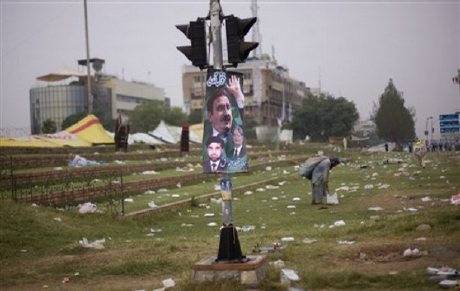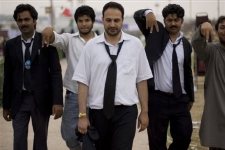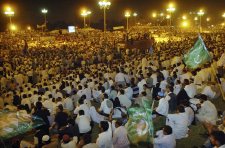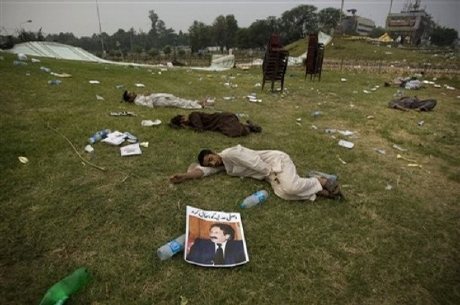THE enthusiasts for the long march towards Islamabad are justifiably feeling let down by the grand posturing, thundering rhetoric and the subsequent retreat from agitation outside the dreary citadels of power in Islamabad’s dark heart.
A Bastille, which was not meant to be? Interpretations abound and explanations are flowing in from the motley groups who ventured to change the contours of state-society relations. The lawyers’ movement is profoundly significant. It constitutes the finest historical ‘moment’ in our troubled history. However, many observers have hinted at its limitations and the problematic phase that the movement has now entered.
Unlike China, Pakistan’s long marches have been nefarious for their results. Orchestrated by political and non-political actors to undermine the democratic process, we are well aware of this stratagem. This time it was different, complex and refreshingly path-breaking alas with similar results: pressurise the beleaguered PPP government still trying to find the proverbial power-ground beneath its truncated legs. In that sense, the march was a roaring success. From the sloganeering against the much maligned Asif Zardari, to de-legitimising three decades of PPP’s valiant struggle against dictatorship culminating in the assassination of Benazir Bhutto.
Irony, that all is now a forgotten snippet of history. What is indeed more pressing, as we are told time and again, are the sacrifices made by the honourable judges. Indeed they have altered the parameters of the state and perhaps buried the subordination of the judiciary to the all powerful executive. Well, one may ask what about Asif Zardari and his eleven and a half years in jail without a single conviction? Therefore the vilification of Zardari by anti-Musharraf sections of the media and by the historical long march is symbolic. It is a testament to the deep-seated middle class trend of demonising politicians and party politics that are prerequisites for democracy and means to establish the ‘rule of law’.
The opportunism of individuals and groups jumping onto the lawyers’ bandwagon is also alarming. It is most convenient to have been all-powerful army chiefs, heads of the ISI and former honchos of the civilian bureaucratic monolith and once the party is over, re-christen yourself as firebrand democrats. The patriotic Hameed Guls, Aslam Begs and Faiz Ali Chishtis and the neo-constitutionalist Roedad Khans and right-wing ambassadors (who slept while Afghans were killed for strategic depth), must be questioned by the anti-Musharraf movement for it was their historical culpability that undermined civilian governance. Is it not important that circumspection be exercised while letting them be the spokespersons of the new vanguard? If Zardari has to be isolated then these dubious characters must also be questioned.
Perhaps the most worrisome aspect is the ‘activism’ of Jamaat-i-Islami (JI). Qazi Hussain Ahmed’s touted apology to the nation was just another political ruse. For most of Musharraf’s reign, JI supported army rule and participated in power-games such as the legitimisation of the seventeenth amendment. The PPP’s constitutional package enunciating amendments to restore the federal and democratic character of the polity is now being trounced by JI! This is cynical hypocrisy. History has still many questions for the JI: from the nefarious role in supporting army action against civilians in former East Pakistan to the jihad games of the 1980s and legitimation of another dictator, Ziaul Haq, whose shadows refuse to leave us. Another guest star of this movement, the fearless jirga-loving Imran Khan was also campaigning for the dubious referendum of 2002. It is still intriguing as to how jirgas fit in the ‘rule of law’ paradigm?
The Jamaat and Imran Khan are deciding what the election results were. Their temerity in doing so goes unnoticed — after terming the February election a farce they refer to the results ad nauseum. Paradoxically, they are rocking the system that has resumed almost after a decade?
Today, Aitzaz Ahsan stands out among the politicians for his oratory and sense of history. It pains to see him dabble into these alliances with groups not known for their principles. Ahsan is a dyed-in-the-wool secular democrat; and is aware of the cul-de-sac where the movement might end i.e. pushing the people’s verdict into the right-wing of Pakistani political spectrum well known for its closeness to the national security state.
Nawaz Sharif might have learnt his lessons in history a la Pakistan style. He has to be wary of the born-again democrats; and may wish to revisit the public statements of these ex-servicemen cohorts, Imran Khan and JI after he was overthrown despite the two-thirds majority. Rationalising civil-military relations therefore should be a foremost priority given that Sharif is eyeing Islamabad in the next election. This can only be achieved through strengthening the democratic process. Unfortunately there is no alternative.
The puritanism of the lawyers’ movement and pitching it against the civilian government is unwittingly making things easier for the invisible hand in Pakistan’s political marketplace. The establishment (that does not include Mr Zardari and his transient sojourn in the corridors of power) could not have it better. The crumbling of the PPP-PML coalition, the continuation of a distorted constitution and resumption of 1990s’ political polarisation is the best formula for business as usual. Hence for any ‘rule of law’ movement, the stakes are bigger than the individuals that the movement is targeting.
Thus the need for a shift in the strategic focus of the movement arises. What is wrong with a refined constitutional amendment if it is backed by parties and the lawyers’ movement? Once enacted, Musharraf’s exit will be certain. This would be an unravelling of the authoritarian insertions and triumph of the legal and democratic system. Justice is not restricted to benches with men of conscience; it also denotes the redistribution of power. Not just between the pillars of the state but also to the disempowered through political representation and electoral accountability.
The other, oft-repeated rhetoric is the route of confrontation. Many had hoped that the thousands in Islamabad would carry out a dharna. But that did not happen ostensibly for ‘lack of resources’. Or is it that the guest stars of the movement are not willing to take on the state? Bourgeois movements rarely lead to street battles. The right could very well be fishing in troubled waters with the tacit support of the faceless power-centres. The route of constitutional process and parliamentary sovereignty can still be considered over the unclear, dangerous path of confrontation.
The writer contributes to Jahan-e-Rumi and Pak Tea House. This article also appeared in Dawn. here.























































Dear Akbar,
Reference your comment:
‘What the march was supposed to do was to send a clear message to Musharraf, to Zardari and to their American masters that the judges issues is still alive and is the benchmark of democracy movement in Pakistan. It did that.’
Does ‘giving a clear message’ justify the time, effort, and money spent on the lawyers’ march? Also, was this objective clearly stated before the march, or is this statement just a retrospective rationalization of the abject failure of the lawyers’ movement to restore the judges?
And finally, are the judgest any closer to restoration now, than they were before the march?
Lawyers Movement to reinstate judges sacked by the military regime even after more than a year of street agitations has not bore any fruits. Why?
Lawyers have chosen ‘street power’ tactics to force first the president and now the parliament to come around to their demands. But what is missing in this scheme is the ‘man on the street’. There is no ‘street power’ unless the ‘man on the street’ is with you.
Lawyers need to find answer to the question that why ‘man on the street’ is not with them on this issue. It could not be simply due to the ‘lack of resources’ or because ‘the guest stars of the movement are not willing to take on the state’. As the author has stated: “Bourgeois movements rarely lead to street battles”.
Lacking the ‘street power’ perhaps lawyers could take heed and think about adopting “the route of constitutional process” and accepting “parliamentary sovereignty”. Such a choice by lawyers may give them opportunity to bring dignity back to their profession and may be in the process regain respect of the ‘man on the street’. So for there has been nothing dignified about the ‘lawyers on the street’.
You are being unfairly harsh. Even the Chinese long march did not bring immediate change. What the march was supposed to do was to send a clear message to Musharraf, to Zardari and to their American masters that the judges issues is still alive and is the benchmark of democracy movement in Pakistan. It did that.
Yes, the movement has attracted some nasty characters. Certainly Jamaat i Islami is one. I think Nawaz Sharif may have actually been reformed. But the point is that this is a mark of the success of the movement that even mainstream parties now have to take this seriously. that is what we call people power.
Actions speak louder than words, and whatever deal or sell-out has been perpetrated by leaders of the long march, will be evident soon enough.
The Pakistani nation’s appetite for rhetoric is amazing. It must be close to two centuries now, that people have been fed vain promises of a glorious future by politicians and ‘leaders’, and yet the poor and the innocent continue to be seduced without learning any lessons at all from their mistakes of the past.
‘A wise man learns from other people’s mistakes, a fool from his own.’ What is he who doesn’t even learn from his own mistakes?
Benazir and Zardari and Nawaz Sharif and their multitude of croonies have miserably failed their own so-called mandates time after time, and yet people worship them like Pirs and Pirnees. And at the same time when the NRO is being enshrined in the constitution, bicycle thieves goes to jail and the jobless commit suicide. What a country, Mr Guide!
The problem here is a fundamental difference of goals between the PPP and the ‘civil society.’
For the ppp and its supporters, the goal is to push the military out and make their own government as powerful as possible, without any checks and balances. This includes the NRO to protect their loot. All their efforts, activism, writings and “sacrifices for democracy” are primarily geared towards this basic goal.
For the “civil society” (which has emerged as a new player), the goal is to have governments that are under appropriate checks and balances and can be held accountable. According to them, even an elected government needs to be kept under constant watch and pressure to make sure that it’s serving the people and not looting and undermining the country.
The writer obviously belongs to the former group and hence his misgivings about the lawyers’ movement are understandable.
This becomes very clear from the following quote from the piece:
“What is indeed more pressing, as we are told time and again, are the sacrifices made by the honourable judges. Indeed they have altered the parameters of the state and perhaps buried the subordination of the judiciary to the all powerful executive. Well, one may ask what about Asif Zardari and his eleven and a half years in jail without a single conviction?”
Rumi Sahib is comparing apples and oranges. CJ Iftikhar got into trouble because he was trying to give relief to the common man and for preventing the loot sale of steel mills and other such theft. Zardari got into trouble for totally different reasons; even if he had been jailed for 100 years or hanged, it would not have made him a hero. The comparison is outrightly ridiculous.